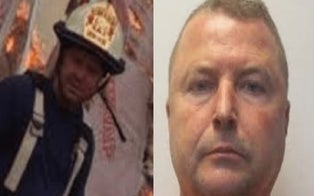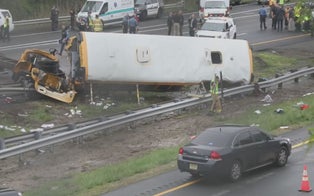Michael O'Neil thought the officer pulling him over would provide an escort to the hospital but instead he was slapped with a $1,500 speeding ticket
A man and his son are outraged after an Illinois trooper pulled them over and refused to let them go as they raced to the hospital because the father was suffering a heart attack, according to reports.
Michael O’Neil was speeding down Interstate 355 to get his father, William, to Good Samaritan Hospital in west suburban Downers Grove when he saw flashing lights behind his car about 10:30 p.m. on September 27, he told the Chicago Sun-Times.
Michael O’Neil told the paper he thought the officer would provide an escort to the hospital, where William had been treated for his first heart attack in 2011.
Instead he was slapped with a $1,500 speeding ticket and was prevented from driving his father to get care, Michael O’Neil said.
William O’Neil, 60, said he told the trooper: "I think I’m having a heart attack. We’re on the way to the hospital."
He asked the trooper if he could reach for his medication, and when O'Neil did, the trooper told him, "You don’t look like you’re having a heart attack," he said.
When Michael O’Neil asked if he could continue on to get his father medical attention, the trooper allegedly said that if it was an emergency, William O’Neil would have to go to the nearest medical center in an ambulance.
“And I said 'Call a f***** ambulance,'" William O’Neil said.
Read: 'Dance Moms' Star Abby Lee Miller Indicted on Bankruptcy Fraud Charges
Emergency responders who came to the scene allegedly told the trooper that William O’Neil's heart readings were abnormal and he was taken to Adventist Bolingbrook hospital. The next day, he underwent surgery and received a stent to fix a blockage in an artery, The Sun-Times reported.
Instead of accompanying his father to the hospital, Michael O’Neil had to remain on the scene to receive his ticket.
'The last thing he said to me was something like, 'You need to slow down next time,'' Michael O'Neil told The Sun-Times.
He was fined $1,500 for going 82 miles per hour in an, at the time, 55 mph zone. The section of road Michael was clocked at speeding in had recently been changed to a 60 mph zone, but new signs were not yet erected and he could still be ticketed for not obeying the old speed limit.
William O’Neil filed a complaint against the trooper in hopes of receiving an apology and to see that the trooper faced appropriate disciplinary action, he told the paper.
The Illinois State Police reviewed William O’Neil’s complaint and found that the trooper acted properly.
Read: Lamar Odom in Coma After Reportedly Suffering Drug Overdose at Nevada Brothel
“The Illinois State Police holds its officers to the highest standards of ethical and professional conduct in the performance of their duties. The public's trust in our officers can never be taken for granted, as such, complaints against department members are taken very seriously,” Sergeant Clare Pfotenhauer with the State Police said in a written statement to INSIDE EDITION.
“Mr. O'Neil's recollection of events are not accurate to what occurred on the officer's in-car video. The officer's conduct was proper and within policy during the incident. Based on the investigation, including a review of the in-car video, the complaint was determined to be unfounded. Mr. O'Neil will receive an explanation letter with our finding,” Pfotenhauer said.
“The number one priority of ISP officers is to save lives which is why the officer called for an ambulance. In most municipalities, it is standard protocol for fire and/or emergency medical services (EMS) to transport to the nearest hospital during life-threatening emergencies,” she continued, noting that William O’Neil was transported to a hospital that was five minutes from the scene, whereas the hospital the pair was heading to was 20 minutes away.
“The first reaction to a medical emergency should be to call 911 and request an ambulance. EMS technicians are specially trained to provide safe transport while rendering lifesaving measures. The chances of causing a crash increase significantly during self-transport, because motorists tend to drive erratically and speed excessively during medical emergencies,” Pfotenhauer said.
“Furthermore, it would be difficult if not impossible to render effective first aid to a passenger or monitor their medical condition while providing self-transport to a hospital," she continued. "ISP Policy strongly discourages officers from escorting civilian vehicles in medical emergencies due to the extreme hazard not only to the escorting officer, but also to the occupants of the escorted vehicle and other motorists.
“The circumstances surrounding Mr. O'Neil's medical condition were unfortunate and understandable to anyone who has had a family member experience the same. We are glad to hear and know that he received medical attention and is doing alright.”
Watch Below: Woman Gets Arrested After She Live Streams Driving Drunk on Periscope






